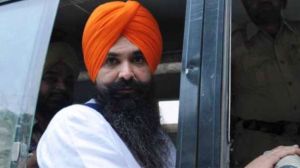What’s SRK’s One-Meal-A-Day (OMAD) diet all about? Find out how this intermittent fasting works
A nutritionist explains who can take it up, who can’t.
 Some evidence suggests that the diet helps in controlling diabetes. Your body starts burning fat if it runs out of sugar, its primary energy source. It leads to significant weight loss because of a reduction in calorie intake. (File image/representative)
Some evidence suggests that the diet helps in controlling diabetes. Your body starts burning fat if it runs out of sugar, its primary energy source. It leads to significant weight loss because of a reduction in calorie intake. (File image/representative)When actor Shah Rukh Khan recently revealed that he had one meal a day to keep himself fit, what he was referring to was the One-Meal-A-Day (OMAD) diet. This is nothing but an extreme form of intermittent fasting where you have one meal a day, usually anytime between noon and evening, and fast through the day except the one-hour mid-point eating window where you may have a nutrient-rich meal.
There are certain rules. For example, you have to eat around the same time every day, you cannot load up on food indiscriminately and stick to heaping food on a standard plate not higher than three inches. And considering the extreme nature of fasting, you can drink beverages throughout the day. But they must be zero-calorie, which narrows down the choice to water, black tea and black coffee.
DOES THE OMAD DIET HAVE BENEFITS?
Some evidence suggests that the diet helps in controlling diabetes. Your body starts burning fat if it runs out of sugar, its primary energy source. It leads to significant weight loss because of a reduction in calorie intake. Fasting has anti-inflammatory effects, which can reduce the risk of chronic diseases. It can stimulate autophagy, a natural process in which the body breaks down and recycles damaged cells and proteins. Many people report improved mental clarity and focus during and after fasting. The diet can be tailored to suit individual needs.
WHAT ARE DRAWBACKS?
Lengthy fasting periods may trigger sudden hunger bouts. You may overeat, get drawn to high fat, high calorie food and gain weight on the rebound. Fasting can lead to nutrient deficiencies if not planned properly. You may feel exhausted, develop nausea and experience low blood sugar.
WHY DO MANY FIT 50-YEAR-OLDS TAKE UP THIS DIET?
After the age of 50, our metabolism slows down and our dietary needs change. That’s why one big meal seems sufficient. Metabolism slows, burning fewer calories, and muscle loss reduces protein and calorie needs. Hormonal fluctuations affect hunger and fullness cues, and digestive changes impact nutrient absorption. Older adults feel fuller longer due to hormonal changes, and reduced physical activity lowers calorie requirements.
But before taking any drastic step, get your health status and fitness evaluated, then consult a doctor or registered dietitian to determine the best meal frequency and nutrition plan for specific needs.
WHO SHOULDN’T FOLLOW THIS DIET?
Not suitable for pregnant or breastfeeding women, diabetics, individuals with a history of eating disorders, and older adults with chronic illnesses. Those under 18 should not consider it at all as they require more calories and nutrients for growth and development.
Intermittent fasting might be especially risky for people who take specific medicines. In the end, a balanced diet with exercise and sleep has a more long-term impact on weight management.
(Narang is nutritionist, Indraprastha Apollo Hospitals, Delhi)
Photos



- 01
- 02
- 03
- 04
- 05




























